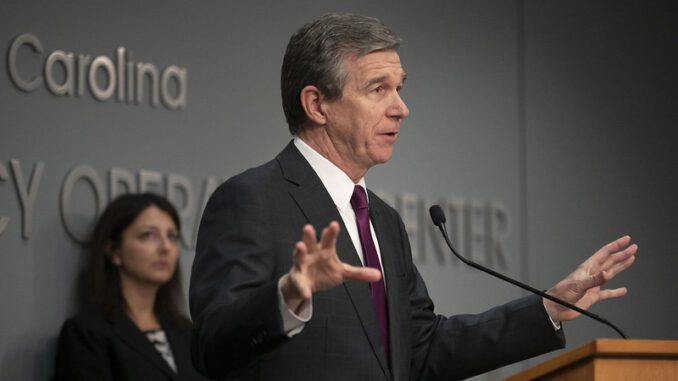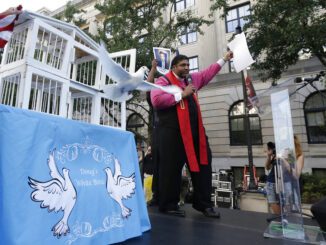
RALEIGH – Gov. Roy Cooper and N.C. Department of Health and Human Services Secretary Mandy Cohen detailed an update to the state’s Strong Schools Public Health Toolkit on Wednesday from the Emergency Operations Center in Raleigh.
In a highly-anticipated announcement, the guidance unveiled says that face masks for students and staff are not required, but state leaders say that school districts should use them for students and staff in Kindergarten through 8th grade settings.
In remarks, Gov. Cooper said the remainder of the state’s mask mandate would expire at the end of the month.
“The most important work our state will do next month is getting all our school children back into the classrooms safely for in-person learning,” said Cooper. “That’s the best way for them to learn, and we want their school days to be as close to normal as possible, especially after a year of disruption.”
Both Cooper and Cohen said the updated toolkit aligned state rules with recent updates from the U.S. Center for Disease Control and Prevention as well as the American Association of Pediatrics. The guidance is effective July 30th and requires local school leaders to implement the protocols in consultation with their local health departments.
Some districts didn’t wait on the state’s update, though. As of July 20, five districts pass such measures: Harnett, Haywood, Randolph, Rowan-Salisbury and Union County public school districts. Some charter schools and some private schools like Thales Academy have also indicated masking will be optional this fall.
In a phone interview, North State Journal reached out to the Randolph County Department of Public Health for comment.
“Well, there’s no mask mandate right now. The CDC guidance just recommends unvaccinated individuals to wear a mask,” Randolph County Public Health Director Tara Aker told North State Journal.
“The current CDC school guidance encourages those that are not fully vaccinated to wear a mask, but again, there’s no requirement,” Aker said. “We would encourage those that are not fully vaccinated to wear a mask but there’s not a mandate.”
Cooper said as the state enters a new phase of the pandemic, most executive orders would expire at the end of the month but the state of emergency would continue.
“The most important work our state will do next month is getting all our school children back into the classrooms safely for in-person learning. That’s the best way for them to learn, and we want their school days to be as close to normal as possible after a year of disruption,” said Cooper.
In the question and answer portion of the press conference, Gov. Cooper was repeatedly asked about what happens if districts don’t mandate masking in schools. He said that state leaders would launch a big push all across the state to make sure it was in place, but didn’t detail a strategy beyond saying the state would work to “get it done.”
The governor did leave the door open to future executive action, citing the Delta variant and a small rise in statewide cases and hospitalizations.
“This pandemic is not behind us yet. If the pandemic worsens and additional action is necessary, we’ll take it,” he added.
State Superintendent Catherine Truitt commented on the announcement, saying in a statement, “Today’s guidance is critically important as school leaders are busy preparing for, or already in the midst of, a new school year. I’m also pleased to see that local-level decision-making will be restored and flexibility provided to local officials. As a proponent of local control, I’ve felt the decision on mask mandates should be made by those most in tune with their student population and know that Superintendents, parents, and school boards will act in the best interest of their students.”
Read the updated guidance here.



